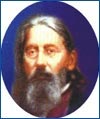Cracking of elbow-joint when moved.
Boring pain in the olecranon depression.
Itching eruption on inside of the right forearm.
Pain in wrist; in back of hands; in fingers and thumbs.
Trembling of hands.
Cracking of skin of hands; peeling of skin from palms.
Hands look blue and veins distended, after washing in cold water.
Inflammation of finger ends, whitlow.
Lower Limbs
Restlessness in the legs.
Great weakness and languor of lower limbs.
Soreness between the limbs of children.
Violent pain in the hip-joint when walking.
Blue spot, with great burning, above the knee.
Boring and drawing pains in the knees.
Leg frequent ” goes to sleep ” when sitting or standing, also when lying on it at night.
Cramp in the leg.
Severe pain in the heels when awaking in the morning, as if ulcerated to the bone.
Heel hurts when standing or walking much, as if festering; sometimes suppuration.
Tearing in ankle and bones of feet, ceases when warm in bed.
Cold feet, particularly when going to bed.
Trembling of the feet.
Ball of the great toe painful.
The great toe becomes red, swollen and painful, particularly in bed, evenings.
Limbs in General
Pain in all the limbs at night, with gnawing pain in small of back.
Inclination to stretch the limbs.
Position etc.
Dislike to move.
Rest : Lying : Must sit quiet : Sitting : Standing : Moving : Stooping : Raising up : Rising : Walking : (in open air), Ascending : Exertion :.
Nerves
Debility : must lie down; and soreness of the whole body.
Sleep
Must sleep in the afternoon, or the eyes pain.
Restless, unrefreshing sleep; tosses about.
Frequent, violent starting out of sleep, with great feat afterward, Nightmare every night, sometimes in a sweat when awaking.
Heart disease.
Somnolence, with blood over-carbonized.
Dreams : vivid; romantic; lewd; anxious; of danger and want; of ghosts; of dying; of dead persons, offensive; of lice; of scolding.
Talks during sleep.
Time
Morning : Afternoon: Evening : Day : Night : After midnight :.
Temperature and Weather
In wet, stormy weather, ill humor, etc.
Very sensitive to cold air, out-doors.
Open air : Warm room : Worm in bed; Coming into room from open air : Washing : Children dislike washing. Worse from wet poultices.
Chill Fever Sweat
Chill evening; frequently alternating with heat, till toward midnight.
Chill increased in open air, lessened in warm room.
Heat, evening, particularly of the face; with cold feet.
Hectic fever. Scurvy.
Sweat in the morning, mostly at the joints.
Sweat on lower part of body.
Continuous day or night-sweat.
Attacks
Worse during new moon.
Sides
Right : Left :.
Sensations
Drawing tension, as from shortening of the muscles.
Pain as if joints were sprained.
Tearing in joints, better in warmth of bed.
Pain as from festering under the skin.
Tissues
Hemorrhage from nose, gums and bowels.
Muscles soft and flabby, emaciation. Scurvy.
Tendency to gangrenous degeneration of the parts. Inflammation of vulva.
Contact Injuries etc.
Touch : Pressure : Scratching :.
Skin
Violent itching; after scratching, burning blisters appear.
Itching lessened by scratching.
Upper half of body as red as scarlet.
Malignant scarlatina, with somnolence, starting from sleep; dark red or putrid sore throat; sticky salivation; parotitis; external throat swollen; stertorous breathing; involuntary stools with excessive vomiting; body red, with miliary rash, or faintly developed eruption threatened paralysis of brain.
Erysipelas of old people hen cerebral symptoms are developed; while the eruption is still out, debility and soreness of the whole body; tendency to gangrenous destruction.
Sometimes relieves the nightly pains of felons.
Desquamation; receding scarlatina.
Stages and States
Scrofulous children.
Stout women, who led a sedentary life, have various troubles in consequence, and readily catch cold in winter.
Erysipelas of old people.
Relationship
Similar to its relatives. Ammonium mur. Ammonium phosph., etc., and to : Ant. tart. (emphysema, etc.; blood poisoned with carbonic acid); Arnic.; Arsen. (inflammations); Aurum. (heart); Apis (scarlatina, miliaria; burning, stinging); Bellad.; Coccul. (muscular asthenopia); Calcarea ostr. (parotitis in scarlatina; pale flabby, etc.); Hepar.; Kali bicr.; Kali carb.; Laches. (erysipelas); Lauroc.; Natr. mur. (muscular asthenopia); Phosphor.; Pulsat.; Rhus tox. (rash, scarlatina with parotitis, etc.); Ruta (muscular asthenopia); Staphis.; Sulphur; Veratr. (cholera-like symptoms during menses).
The presence of miliary rash may distinguish it from the sometimes similar [Bellad] in scarlatina.
Inimical to Laches.
Antidote to : poisoning with [Rhus tox]; stings of insects.
Antidoted by : Arnic., Camphor., Hepar. vegetable acids, fixed oils, as castor. linseed, almond and olive oils.

